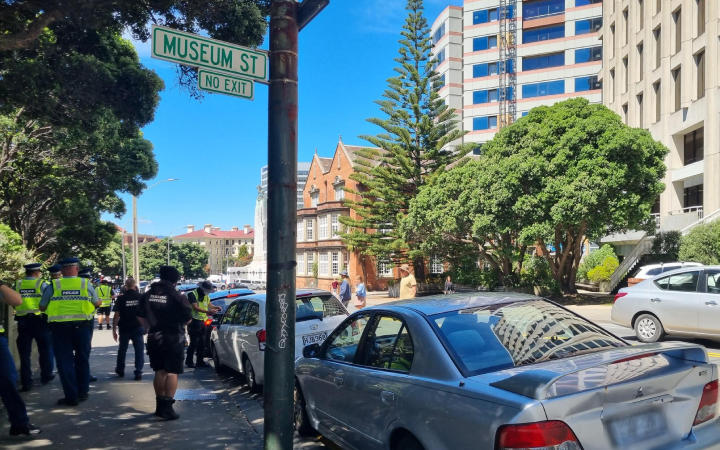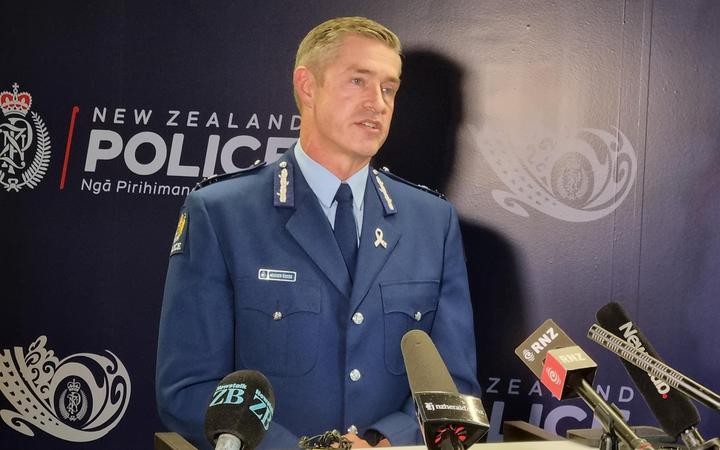Police is putting into action its Major Operations Centre at the headquarters in the capital in a bid to quell protesters “unreasonably impacting the city”.
 Police are moving to clear the roads outside and near Parliament as protesters continue to occupy the area for the eighth day. Photo: RNZ
Police are moving to clear the roads outside and near Parliament as protesters continue to occupy the area for the eighth day. Photo: RNZ
About 1000 people are outside the Beehive today, protesting against a range of the government’s Covid-19 measures.
It is the eighth day of the occupation, which has been inspired by similar movements overseas.
Nearly 200 parking tickets were handed out to the protesters at Parliament, with wardens out this afternoon ticketing vehicles blocking roads and illegally parked near the protest.
But only one of the 180 issued before today has actually been paid.
While protesters have been given free parking at nearby Sky Stadium in a bid to clear the streets, there were only about 40 vehicles there when RNZ visited earlier, despite space for up to 450 vehicles available on the ground floor.
In a statement, Police Commissioner Andrew Coster said it acknowledged the right to lawfully protest, but the effect of this protest around the Parliament grounds, on roads, residents, schools and businesses, was “no longer tenable”.
“Having followed international developments, police considers it unwise to escalate tensions, and we have offered alternatives that would enable the roads to be cleared.
“However, protesters have not taken up the offer and nor have they shown any concern for the negative impact of their activities.
“Police will continue to give protesters the opportunity to remove their vehicles voluntarily, but time is fast running out for this to happen.”
 Earlier today parking wardens were seen handing out tickets. Photo: RNZ
Earlier today parking wardens were seen handing out tickets. Photo: RNZ
Coster warned that if roads were not cleared then vehicles blocking the way would be towed, which would be seized and not immediately released.
Anyone who obstructed police efforts to clear the roads could be arrested and charged, he said.
“We continue to encourage protesters to do the right thing and facilitate opening of roads in the area.
“It is possible for this protest to be conducted lawfully but the current manner of protest is both unreasonable and unfairly impacting others.”
The Defence Force has confirmed it responded on Friday to the police request for assistance in removing vehicles blocking the streets in Wellington, but that discussions remain ongoing.
A spokesperson said there were a number of factors to be considered – not least the suitability of military recovery vehicles for this task and the availability of trained personnel.
They said this had been discussed with police.
Coster said police had an ongoing willingness “to work in good faith”, but it was clear from international experience that that was “no easy resolution to protests of this nature”.
“The safety of the public and consequences of escalation are a significant factor in our decision making.”
 Police Commissioner Andrew Coster. Photo: RNZ / Jake McKee
Police Commissioner Andrew Coster. Photo: RNZ / Jake McKee
A media statement issued from some of the protest groups at Parliament said they were “actively engaging” with the police.
The statement – issued on behalf of half a dozen groups including Voices for Freedom – said there were a variety of views held by those on Parliament’s lawn but all were united in demanding the end of vaccine mandates.
The statement said they had been working with police on traffic management and were mindful of public safety and minimising disruption to those living and working in Wellington.
A number of people told RNZ they found the protest an inconvenience and wondered when it would end.
“I think it’ll take another storm like the one in the weekend to get them going. But honestly, I wouldn’t be surprised if they were still here for another week or two,” one said.
“Market’s pretty empty … a lot of people are avoiding the area, especially vulnerable people. We’ve got friends that are pregnant that just won’t leave the house … won’t come into town,” another said.
Meanwhile, a day-care near Parliament said parents were being yelled at for wearing masks while dropping off their children.
The day-care often used the Parliament playground but the children are being kept inside until the protest clears.
The MOC will manage and coordinate resourcing, response options, logistics, and health and safety, with Assistant Commissioner Richard Chambers appointed as national controller of the operation.
